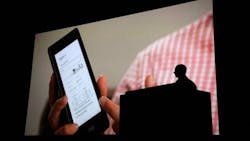Apple Clashes With Amazon in E-Book Case
NEW YORK—Apple attorneys in the U.S. antitrust case on e-books went on the offensive Thursday, attacking the credibility of government witnesses and seeking to debunk key elements of the government's case.
Apple attorneys grilled a trio of witnesses from Apple rival Amazon and undertook a bruising cross-examination of a Google executive.
Apple attorney Howard Heiss peppered Amazon executives during a series of contentious exchanges with skeptical questions on Amazon statements about its business profile and pointed out inconsistencies between Amazon testimony and documentary evidence.
Amazon is very "metrics-focused," Heiss said to Amazon's vice president for Kindle, Russell Grandinetti, during a cross examination.
Grandinetti had previously testified that he did not know Amazon's market share of the e-books market.
"We were a very large seller of e-books," Grandinetti said, while denying he could estimate Amazon's market share.
Heiss then presented a news article quoting another Amazon executive estimating the company's market share at 70% to 80%.
Vital Testimony
Amazon is a key witness in the government's case, which maintains that Apple conspired with publishers to orchestrate a transformation of the e-book market in early 2010 that cost consumers hundreds of millions of dollars.
In entering the market, Apple signed a series of "agency" model contracts with publishers, in which publishers set the price and guaranteed Apple a 30% commission.
Prior to Apple's entry, the e-book industry was dominated by Amazon and run on a "wholesale" model where retailers set the prices. Amazon charged $9.99 for bestsellers prior to Apple's entry into the market.
Part of the government's case is that Apple and publishers forced Amazon to switch to the agency model, resulting in higher prices.
Apple attorneys sought to show that Amazon faced an increasingly difficult market in late 2009 and early 2010 in which publishers were already planning hardball tactics—even before Apple's entry.
Amazon's pricing model was unpopular not only with publishers, but also with agents and authors who worried about the erosion of intellectual property.
Postponed Releases
Grandinetti confirmed that by the end of 2009 four of the "Big Six" publishers announced plans to "window" bestselling books, meaning they would delay release of the Amazon e-book for a period of months until after the release of the physical book.
As five of the major publishers signed agency models with Apple, they contacted Amazon to renegotiate terms.
The first negotiation was with MacMillan Chief Executive John Sargent, who presented Amazon with the choice of shifting to an agency model or accepting a wholesale model with windowing for seven months.
"We expressed quite strongly how unpalatable the choice was," Grandinetti said of his encounter with Sargent. "The meeting was very tense."
Amazon initially tried to punish MacMillan by removing the "buy" button from MacMillan titles.
But Amazon ultimately capitulated after three days and quickly negotiated the agency model with MacMillan.
Soon after that, Amazon negotiated similar contracts with the other four publishers.
Who Started It
Apple attorneys sought to show that Amazon's shift to the agency model was its own decision and not orchestrated by Apple.
But Amazon officials testified that the publishers were forcing the change at Apple's behest.
Laura Porco, who was director of Amazon's Kindle Books at the time, told the court in a written declaration that the publishers informed Amazon that they were switching to agency "because that's what Apple made them do."
Porco told the court Thursday she was "alarmed" when the publishers demanded agency from Amazon.
"I felt like we were being pushed into something that was really terrible for consumers," Porco said.
Following Porco's testimony, Apple attorney Orin Snyder aggressively questioned Thomas Turvey, an executive in Google's book selling division.
Turvey said in a written deposition that publishers told him that they could not accept wholesale terms with Google because of their terms with Apple.
During the testimony, Turvey was unable, however, to name a single publishing executive who said this.
Copyright Agence France-Presse, 2013
About the Author
Agence France-Presse
Copyright Agence France-Presse, 2002-2025. AFP text, photos, graphics and logos shall not be reproduced, published, broadcast, rewritten for broadcast or publication or redistributed directly or indirectly in any medium. AFP shall not be held liable for any delays, inaccuracies, errors or omissions in any AFP content, or for any actions taken in consequence.
